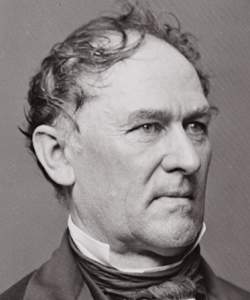Orville Hickman Browning (Congressional Biographical Directory)
Reference
BROWNING, Orville Hickman, a Senator from Illinois; born in Cynthiana, Harrison County, Ky., February 10, 1806; attended Augusta College; studied law; admitted to the bar in 1831; moved to Quincy, Ill., in 1831 and practiced; served in the Illinois Volunteers during the Black Hawk War 1832; member, State senate 1836-1843; unsuccessful candidate for election as a Whig in 1850 to the Thirty-second Congress and in 1852 to the Thirty-third Congress; delegate to the anti-Nebraska convention held at Bloomington, Ill., in May 1856, which laid the foundations of the Republican Party; appointed as a Republican to the United States Senate to fill the vacancy caused by the death of Stephen A. Douglas and served from June 26, 1861, to January 12, 1863, when a successor was elected; was not a candidate for election in 1863; chairman, Committee on Enrolled Bills (Thirty-seventh Congress); appointed by President Andrew Johnson as Secretary of the Interior 1866-1869, also discharging for a time the duties of Attorney General; delegate to the State constitutional convention in 1869; resumed the practice of law; died in Quincy, Adams County, Ill., August 10, 1881; interment in Woodland Cemetery.
“Browning, Orville Hickman,” Biographical Directory of the United States Congress, 1774 to Present, http://bioguide.congress.gov/scripts/biodisplay.pl?index=B000960.
Orville Hickman Browning (American National Biography)
Scholarship
Browning advocated vigorous prosecution of the war in its early stages. He supported Lincoln's call for troops, voted for the First Confiscation Act, and even supported John C. Frémont's proclamation freeing slaves in Missouri. However, early in 1862 he broke with the radicals in Congress over the Second Confiscation Act, which he felt unconstitutionally deprived southern slaveholders of their property. Regarding emancipation, Browning adhered to Lincoln's earlier formulation of compensated emancipation and colonization and felt slavery was entirely a matter for the individual states to decide. Thus he opposed the issuance of the Emancipation Proclamation, and even at the end of December 1862 he was still trying to convince Lincoln not to put it into effect. Browning also criticized the suppression of the Chicago Times, arbitrary arrests of civilians, and the vilification of southerners in the press and Congress. Many fellow Republicans viewed him as hopelessly conservative. While Browning remained true to the Union cause, he felt the war effort was being controlled by radical elements with dangerous views, and he gave no support to Lincoln in the 1864 election. In fact, he never again supported a Republican candidate for president.
Brian J. Kenny, "Browning, Orville Hickman," American National Biography Online, February 2000, http://www.anb.org/articles/04/04-00164.html.





